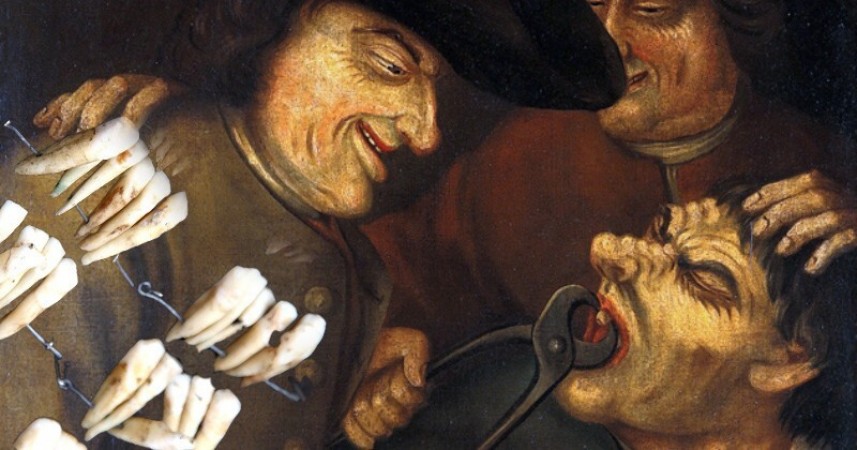
"Waterloo Teeth" refers to dentures made from teeth removed from the bodies of soldiers who died in the Battle of Waterloo in 1815. The term has since became very famous . Following the Battle of Waterloo, the demand for dentures surged. soldiers had lost their teeth due to injuries sustained during the battle. At the time,
 there were no synthetic alternatives available, so dentists turned to a readily available source: the fallen soldiers themselves. Dentists and entrepreneurs scavenged the battlefield for teeth, which they then collected and used to create dentures for those who could afford them. The teeth were extracted from the deceased soldiers' bodies, cleaned, and processed. They were then mounted onto denture bases made of materials like ivory, bone, or metal. These dentures, known as "Waterloo Teeth," became highly sought after, not only for their functionality but also for their historical significance. It was believed that these dentures brought a certain degree of prestige and valor to their wearers, as they were seen as symbolic of the bravery of those who fought in the battle. However, the practice of using teeth from fallen soldiers was not limited to Waterloo.
there were no synthetic alternatives available, so dentists turned to a readily available source: the fallen soldiers themselves. Dentists and entrepreneurs scavenged the battlefield for teeth, which they then collected and used to create dentures for those who could afford them. The teeth were extracted from the deceased soldiers' bodies, cleaned, and processed. They were then mounted onto denture bases made of materials like ivory, bone, or metal. These dentures, known as "Waterloo Teeth," became highly sought after, not only for their functionality but also for their historical significance. It was believed that these dentures brought a certain degree of prestige and valor to their wearers, as they were seen as symbolic of the bravery of those who fought in the battle. However, the practice of using teeth from fallen soldiers was not limited to Waterloo.
Throughout history, teeth extracted from various sources, including battlefields, graveyards, and even executed criminals, were used to make dentures. This practice persisted well into the 19th century until the development of more hygienic and advanced dental techniques. Despite these ethical concerns, Waterloo Teeth remain a significant artifact of dental history, serving as a reminder of the primitive methods and harsh realities of early dentistry. Today, advances in dental technology have rendered practices like using human teeth for dentures obsolete. Instead, modern dentistry offers a range of options for tooth replacement, including dental implants, bridges, and advanced prosthetics, all of which are safer, more hygienic, and more ethical alternatives. Waterloo Teeth symbolize a bygone era in dentistry when innovation was often born out of necessity and resources were scarce. While the practice may seem shocking by today's standards, it provides valuable insights into the history of dentistry and serves as a testament to human ingenuity and adaptability in the face of adversity.
These 5 places of Rajasthan give the feeling of winter in summer
Japan Launches Easier Visa Process for Indian Tourists: Here's How to Apply Online